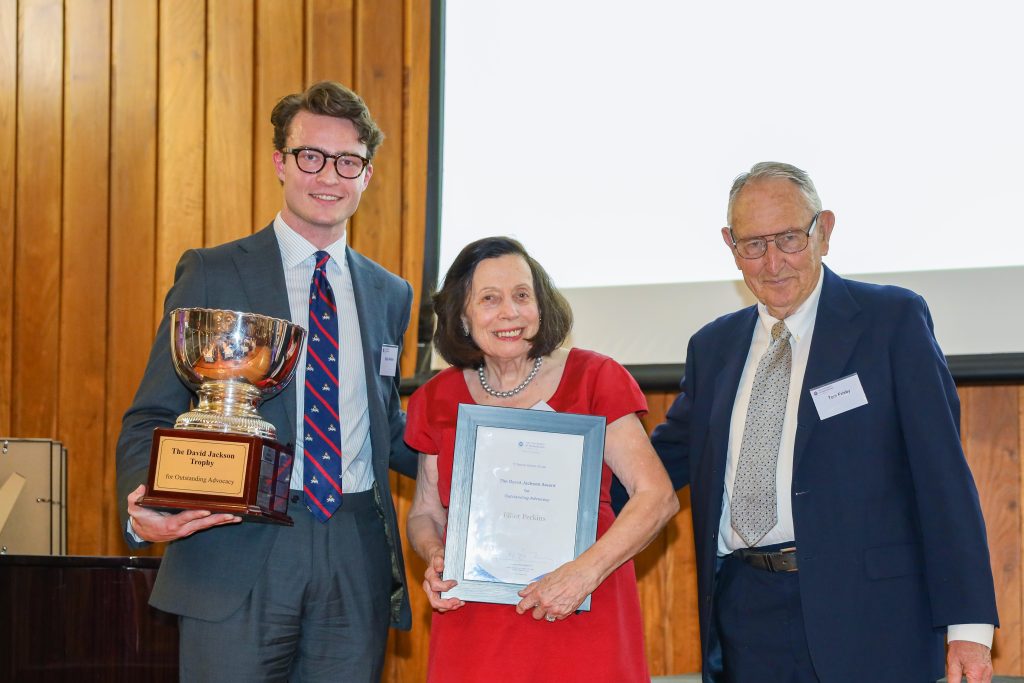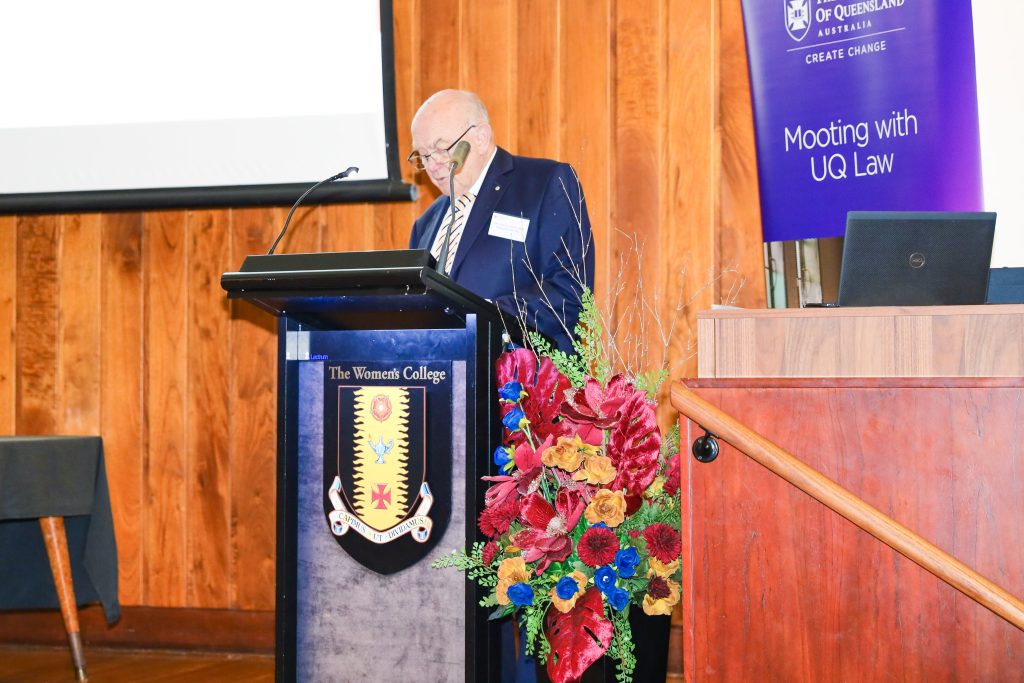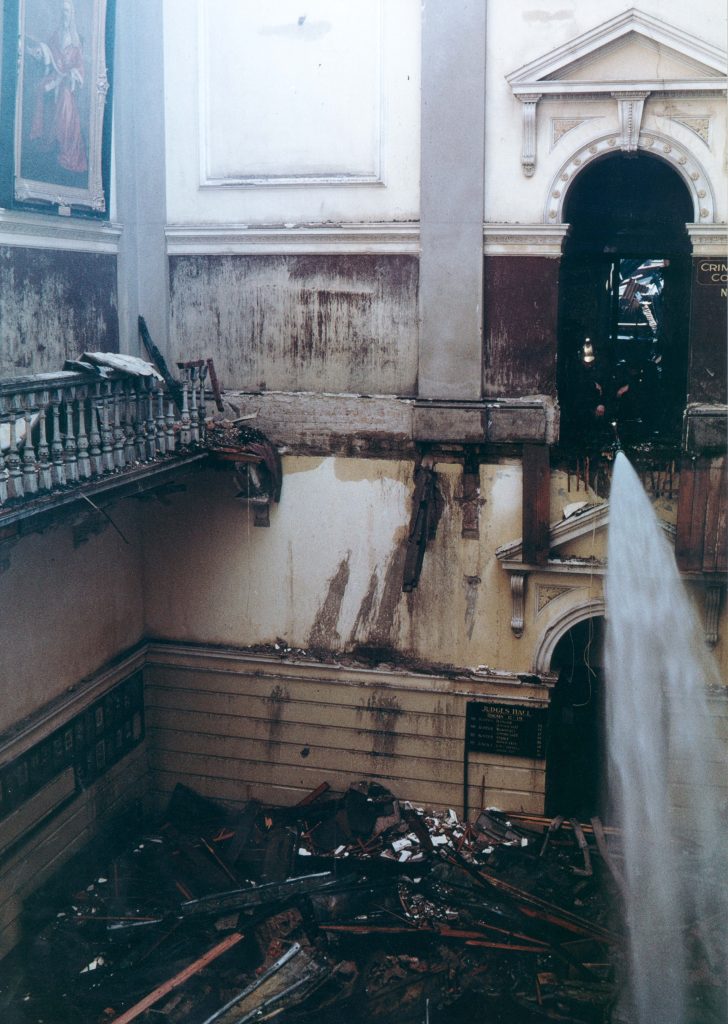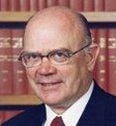FEATURE ARTICLE -
Articles, Issue 94: Dec 2023
On Thursday the 23rd of November 2023, the David F Jackson Memorial Mooting Dinner was held at the University of Queensland. The dinner has been held annually since 2012, and is the “awards night” for students who participate in the University’s wide-ranging mooting program. In previous years, the Hon David Jackson KC has attended the dinner, to present the David Jackson trophy (purchased by David himself) for ‘Outstanding Advocacy’. This year – on account of David’s recent demise – his sister in law, Anne Frisby, attended with her husband Mr Tom Frisby to present the trophy on behalf of David’s family, to Elliot Perkins, the 2023 winner of the trophy. The Honourable Glen Williams AO KC – long-time friend to and colleague of David – delivered a speech about David’s career at the bar, especially his early and later years.

Elliott Perkins, Anne Frisby and Tom Frisby
It is very fitting that a trophy for advocacy has been donated by and is named after David Jackson AM, KC. If any proof was needed it was provided by the Hon Susan Kiefel, then Chief Justice of the High Court, in her eulogy delivered at the memorial service for David on 25 May 2023. Therein she said:
“David learned and honed the skills of an advocate long ago. He set a standard. His style was elegant, his tone soft, his language simple and his argument succinct. He was composed under pressure.”
The Chief Justice went on to record that on hearing of David’s pending retirement the High Court decided to invite him to a luncheon to mark the occasion. Unfortunately, he died on 15 May 2023 before that function could be held. But it is significant that no other advocate in the history of the High Court has been offered such an honour. It really was a reflection of the fact that records show he appeared in 296 cases in the High Court.
It is instructive to look at what lay behind that achievement.
David was born in Ipswich on 8 May 1941. He was the youngest of seven children; his nearest sibling was almost a generation older. His father died when David was seven years old. He did well at school and won scholarships to attend secondary schools in Brisbane. He lived with an aunt in Brisbane so he could attend Marist Ashgrove as a day boy.
After a year of engineering at the University of Queensland he switched to law. He obtained an Arts degree in 1963 and a law degree in 1964. He won prizes but did not get honours as in those days one had to do an extra year’s work to attain that.
Probably the most significant influence on David’s development as a lawyer was the two years 1963 and 1964 he spent as associate to Sir Harry Gibbs, then a judge of the Queensland Supreme Court. Sir Harry was a meticulous black letter lawyer. Anyone who had the fortune to work with him soon appreciated the importance of preparation. A detailed knowledge of relevant facts was essential to the proper application of legal principles. David was a good learner and preparation was a hallmark of David’s career and in no small way the reason he was so successful.

Glen Williams AO KC
David was called to the bar in 1964 and started practice in chambers above a fruit shop at 26 Queen Street in 1965. The walls did not go to the ceiling – not the best for a barrister wanting to have a confidential conference with a client. Early in 1966 he moved to the Inns of Court at 107 North Quay, the converted boot factory – but more of that in a moment.
At this time I would like to move to the last week in August 1968, a significant week in David’s career.
On the Monday a rape trial began in No, 1 Criminal Court in the old Supreme Court. It was a marvellous courtroom. High ceiling, cedar furnishings, large bar table and elevated bench. It reeked history. Many historical trials had taken place there, including, for example, bushrangers like Kenniff. I was for the first accused, David the second, and there were others. It was not surprising David was in a criminal trial. In those days all junior barristers cut their teeth in the higher courts in criminal trials. It was also a critical part of extending one’s experience as an advocate. Addressing a jury was an art in itself. Also having to explain to a jury concepts such as provocation and self-defence, difficult concepts even for lawyers. required a skill in advocacy. It was a good training ground for David.
The prosecution case closed just after lunch on the Friday. David wanted to make a no-case submission, but I did not initially support that as the trial judge had recently held in another case that such a submission was not appropriate where consent was the issue. David was adamant and I eventually agreed with him. I got from the library a number of relevant law reports. To cut a long story short, the trial judge sat until well after 5pm and ruled in our favour. As the library had closed by then we left the law reports on the bar table.
As we walked back to chambers David confessed to me why he had been so adamant about making a no-case submission. He had his first High Court brief on for hearing the next Wednesday and he would have had to throw the brief if the trial had gone on.
Move now to just after 11pm on Saturday night. David was in his chambers working on his High Court brief. When one thinks of David’s chambers most people today think of his chambers in the top floor of the building at the corner of Hunter and Macquarie Streets with a view all the way down the harbour to the Heads. But that was not the case in 1968. As I said earlier David had moved into the Inns of Court but his chambers were virtually below street level. There was a small window just below the nine foot ceiling. David’s attention was drawn to some glow flashing in that window. He went to the front of the building to investigate. Diagonally opposite the Inns of Court, the O’Connor boat house was on fire. The upper floor was used as a dance hall on Saturday nights but that function had ceased at 11pm. David was surprised there was no fire brigade in attendance at the fierce blaze. For some reason he turned around and saw flames leaping through the roof of the Supreme Court. An arsonist had set fire to the court and the boathouse. The fire had been set at the bar table we had left on the Friday afternoon. The law reports we left on the bar table were probably used in starting the fire. So far as is known David was the only lawyer to see the court on fire at its peak; others arrived shortly after.

Reproduced with permission from the collection of the Queensland Supreme Court Library.
The High Court matter on the Wednesday settled. We jokingly ribbed David that the Sydney silk opposing him panicked on hearing David had been working on his brief at 11pm on a Saturday night.
So in that week David had appeared in a criminal trial, in fact the last trial in the historic No 1 criminal court, had seen the Court on fire, and dealt successfully with his first brief in the High Court. What emerges so far as his future success is concerned is his persistence in submitting for a no case notwithstanding some precedents against him, and his willingness to spend a Saturday night working on preparation.
Moving on. In 1976 at the age of 34, David took silk and his High Court practice grew quickly. He appeared on a number of occasions before the Privy Council. In 1985 he was appointed a judge of the Federal Court based in Sydney. He decided with some regret to leave the Court in 1987 and return to private practice in Sydney. He quickly became regarded as one of the leading constitutional lawyers in Australia. He was in constant demand to appear before the High Court. In 2007 David was made a Member of the Order of Australia. He had a number of interests outside the law. He was a devoted family man. For many years he held officer rank in the Army Reserve. He was a Knight of the Order of Malta and was heavily involved in charitable works.



 Elliott Perkins, Anne Frisby and Tom Frisby
Elliott Perkins, Anne Frisby and Tom Frisby
 Glen Williams AO KC
Glen Williams AO KC
 Reproduced with permission from the collection of the Queensland Supreme Court Library.
Reproduced with permission from the collection of the Queensland Supreme Court Library.